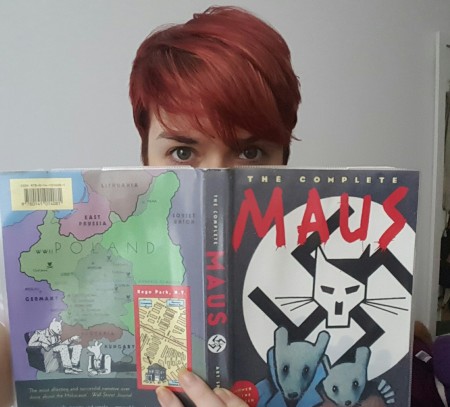Today is Holocaust Memorial Day. It is the 72nd anniversary of the liberation of Auschwitz-Birkenau, the infamous concentration camp and site of the systematic murder of an estimated 1.1 million people.
The Complete Maus is a graphic novel, written and drawn by Art Spiegelman. It was originally a serialisation depicting interviews between Art and his father, Vladek, a Polish Jew and Holocaust survivor. In the interviews, Vladek tells Art about his experiences in the war, including his time spent in Auschwitz.
Let’s be clear – this was not an easy read. It is an important one though; in fact, The Complete Maus became the first graphic novel to win the Pulitzer Prize. Here are a few of the reasons I think it is important for this kind of story to be told, heard and seen:
A reminder of humanity
The Complete Maus isn’t a history book, as such. It’s not an overview of Hitler’s rise to power, nor is it full of statistics and facts about the atrocities that were committed or the social and political factors at work. That stuff is important too, don’t get me wrong, but I think that what made these atrocities (and others like them) possible was the initial dehumanisation of people. For the Nazis, the Jewish people were the main focus of that dehumanisation – in fact, the book opens with a quotation from Hitler saying exactly that: “The Jews are undoubtedly a race, but they are not human.” For subsequent genocides, of course, other social or religious groups were the scapegoats and victims. The principles are the same; when we make people into the ‘other’, it becomes easier to think of them as not human, or as less than human. And when we think of people as less than human, it becomes easier to justify blaming them for the things that we are unhappy with (like unemployment, crime, or poverty) and to justify hurting them, or taking away their voices, freedoms, property… and eventually their lives. It’s easier to be frightened of someone that is less than human, and it’s easier to deal with hatred and anger than fear.
The Complete Maus is an intensely human story. It’s very personal – it covers not only one man’s recollections of his own experience (acknowledging the perspective of memory) but also looks at the relationship between Art and his father. There’s one moment where Art’s wife tells off Vladek for his blatant racism towards black people – she asks in disbelief how he, of all people, could possibly hold such prejudice based on race – and Spiegleman unflinchingly includes the whole exchange in the book. He doesn’t ‘other’ his father by making him into some kind of saint… he humanises him. This guy, this survivor, this Polish Jew living in New York – he’s a real human being, warts and all, just like you or me or Mother Teresa or Trump or Katie Price or David Cameron or Ghandi. That’s what was stolen from him when he had his property, his hair, his name and his liberty stolen. And that’s why what his son did for him is so profound.
Those who don’t learn from history…
Another incredibly important reason, of course, is so that we never forget. Collectively, this horror should never be forgotten, so that we never go back there again. So that we recognise the signs next time. So that we speak up, act, vote, march, rescue… so that we protect and promote each others’ humanity.
I’m not going to say too much about the current political climate, because there are plenty of people much smarter than me who have more to say and say it better. But I will say this; whichever way you vote, whatever you think about the EU or about President Trump, the rise of hate crimes and hate speech in recent times is something we can all address. I’m a big proponent of the ‘do what we can, when we can, where we can’ approach… if for you, that looks like joining marches and protests, do that. If it looks like stepping in to talk to and stand alongside someone who is the victim of racially aggravated street harassment, do that. If it looks like getting to know your neighbours; or using your voice of privilege to make sure other, less privileged voices get heard; or taking in a refugee; or volunteering for a charity; or teaching your children to respect women and those of different faiths; or challenging someone’s prejudice in conversation at the office; or simply showing love and tolerance as much as you can to each person you meet… do that.
A mark of respect
Finally (for this post, anyway), I think this story – and others like it – are important, because remembering is a sign of respect. It’s acknowledging the wrongness of what happened, honouring the lives lost and the sacrifices made. If you want to find out more about Holocaust Memorial Day, the Holocaust Memorial Day website is a good place to start. Like poppy day in the UK has come to stand for the veterans of many wars, not just WWI; Holocaust Memorial Day has come to encompass more than the infamous ‘Final Solution’ – there are dedicated sections on the website for Cambodia, Bosnia, Rwanda and Darfur. Let us honour the humanity of those who have suffered.


2 thoughts on “The Complete Maus – Art Spiegelman”